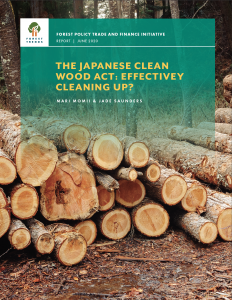The Japanese Clean Wood Act: Effectively Cleaning Up?
By Mari Momii and Jade Saunders View PublicationIn May 2016, the Government of Japan introduced the Act on Promotion of Use and Distribution of Legally- Harvested Wood and Wood Products – also known as the Clean Wood Act (CWA).
Though it is Japan’s first piece of legislation requiring companies to trade in legal timber, the CWA created no penalties for those found to be trading in illegal timber or failing to conduct due diligence. Instead, it aimed to promote legal practices by creating provisions for companies to register as a “Registered Wood-related Business Entity.” To apply for registration, companies must hold documents confirming the legal status of the wood used throughout their supply chain. Unfortunately, however, it remains unclear which documents qualify as adequate.
The scope of the CWA is expected to be reviewed and, if appropriate, revised in 2022. Based on documentary analysis and interviews, this report reviews the legislative developments that led to the Act’s creation, synthesizes the latest available information (as of April 2020) on the impact of its provisions and implementation, and makes recommendations for its 2022 review.

